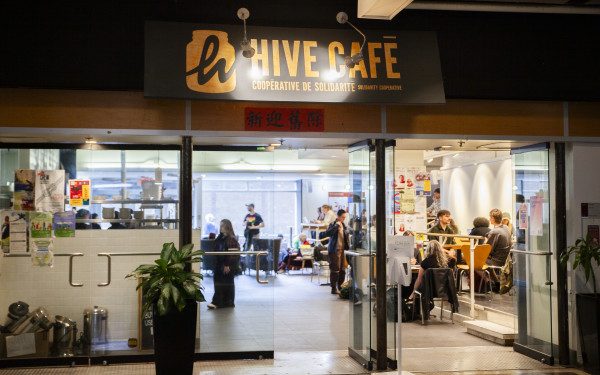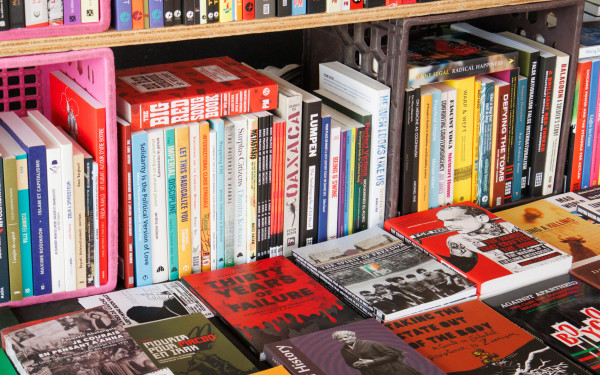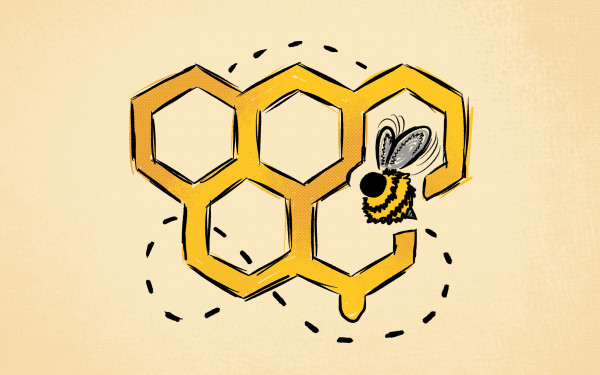SCPA Panel Breaks Down Right-Wing Populism
Activists Map Out Left-Wing Strategies in SCPA Panel
From the elections of Donald Trump and Jair Bolsonaro in the Americas to the rise of the Sweden Democrats and Brothers of Italy in Europe, there has been a revival in the prominence of right-wing parties around the world.
How did these parties reach power? Through a populist approach.
On Jan. 31, students from Concordia’s School of Community and Public Affairs launched their annual panel series. The first of these was Rise of the Populist Right: Charting a Strategy for the Left, organized by students Emilie Cunial, Hana Sherafati Zanganeh, and Caleb Woolcott.
The event was moderated by Becca Wilgosh, vice president of the Teaching and Research Assistants at Concordia union, and took place at the Hive Café Solidarity Cooperative in the Hall building.
Four activists involved in the fight against the extreme right took to the microphone in front of dozens of students.
The panel was composed of Terri Givens, a McGill professor and author, speaker and consultant on immigration, systemic racism and inclusion; Nora Loreto, a writer, activist and podcaster engaged in social movement organizing; Maya Menezes, a climate justice and labour campaigner at STAND.earth; and Mostafa Henaway, a community organizer for migrant workers at the Immigrant Workers Center in Montreal.
Even though populism is very complicated to conceptualize because of its many approaches, the speakers managed to formulate a concise definition. The concept of populism emphasizes the idea of “the People,” which is set in opposition to “the Elites” that can be found either in the left or in the right wing.
Givens highlighted that populists “try to reach out to those who are left behind.” She said that populists take advantage of isolated people who don’t feel represented enough and that start to lose confidence toward current institutions.
Moreover, populist approaches are usually very similar to one another. Menezes emphasized how their communication is overwhelming. Right-wing populists present solutions to each duress that could be brought up from other parties. In a world full of insecurity and doubts, this movement is here to comfort individuals. “It makes sense that they're really scared and no one is going to offer them alternative solutions,” added Menezes about people who vote for or support populists.
“It makes sense that they’re really scared and no one is going to offer them alternative solutions.” — Maya Menezes
In Canada, populism is also gaining traction. Demands for the removal of Amira Elghawaby by Quebec’s National Assembly, the Freedom Convoy in 2022 and the leadership of Pierre Poilievre in the Conservative party are examples of this rise.
As new statistics about popular vote projection have been published, the Conservative Party of Canada may win the next federal election. The party has garnered 35 per cent support against approximately 31 per cent for the Liberal party.
However, the right wing in Canada is not the only beneficiary from the approach of populists. The panelists agreed that liberals have a real profit from the rise of right-wing populists, a well-balanced critique the audience appreciated.
“Justin Trudeau can go around all day saying how much he loves refugees and how much he loves migrants,” Henaway said, “but the Liberals have no desire to have uncontrolled migration on our borders. The far-right populists have a more coherent narrative at this moment.”
On top of that, speakers raised the fact that the population tends to only focus on the last stage of problems—the outcomes—but must understand and acknowledge that the real problem is that “the system is broken,” as Loreto said.
How can other political parties act to fight against right-wing populism with inclusion and without being reactionary? The panelists agreed on multiple ways that would help constrain the impact of extremists, among which were coalition, union and solidarity.
Henaway highlighted his belief that unions are at an impasse due to the lack of action and risk-taking on their part: “We don't need to water down our politics,” he said, affirming the need to make people’s voice heard by making smart decisions accompanied by actions. Through activism, solidarity will be created and will make a stronger group with a stronger capacity to achieve goals, he added.
Woolcott described why it is important for discussions like this one to take place. "We decided to host this panel because so far, it's Trudeau and the Liberals who have been benefiting the most by responding to the far right—and their response has been to applaud the free trade and policing systems that we know have failed.”
“We wanted to foster a strategy session on responding to the far right in a way that also addresses the problems with our neoliberal status quo and actually pushes for transformative, systemic change," Woolcott said.
This article originally appeared in Volume 43, Issue 11, published February 7, 2023.







